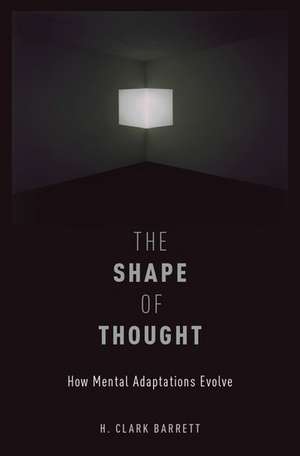The Shape of Thought: How Mental Adaptations Evolve: Evolution and Cognition Series
Autor H. Clark Barretten Limba Engleză Paperback – 12 feb 2015
| Toate formatele și edițiile | Preț | Express |
|---|---|---|
| Paperback (1) | 291.38 lei 31-37 zile | |
| Oxford University Press – 12 feb 2015 | 291.38 lei 31-37 zile | |
| Hardback (1) | 762.44 lei 31-37 zile | |
| Oxford University Press – 19 feb 2015 | 762.44 lei 31-37 zile |
Preț: 291.38 lei
Preț vechi: 346.25 lei
-16% Nou
Puncte Express: 437
Preț estimativ în valută:
55.75€ • 58.38$ • 46.25£
55.75€ • 58.38$ • 46.25£
Carte tipărită la comandă
Livrare economică 29 martie-04 aprilie
Preluare comenzi: 021 569.72.76
Specificații
ISBN-13: 9780199348312
ISBN-10: 0199348316
Pagini: 416
Dimensiuni: 155 x 231 x 31 mm
Greutate: 0.52 kg
Editura: Oxford University Press
Colecția OUP USA
Seria Evolution and Cognition Series
Locul publicării:New York, United States
ISBN-10: 0199348316
Pagini: 416
Dimensiuni: 155 x 231 x 31 mm
Greutate: 0.52 kg
Editura: Oxford University Press
Colecția OUP USA
Seria Evolution and Cognition Series
Locul publicării:New York, United States
Recenzii
Rich and thoughtful, this book lays out why, if we want to understand human psychology, neural plasticity, cultural differences and cognitive development, we need evolutionary theory, and an understanding of how humans evolved. In Barrett's hands, the pernicious dichotomy that divides "learning" from "innate" explanations crumbles, leaving only evolutionary explanations, which may involve different types of developmental processes. In setting the house back in order, Barrett synthesizes insights and findings from psychology, culture-gene coevolutionary theory, anthropology, developmental biology and philosophy. He delivers Evolutionary Psychology 2.0.
In this lucid book, Barrett explains how thinking about the evolution of the mind should shape our understanding of how the mind works. Bringing sophisticated knowledge of evolutionary biology and cognitive science together, he reconciles opposing views about the role learning and culture in the workings of the human mind. This book will be the bible for a broader, more inclusive evolutionary psychology.
Barrett has read your mind, and knows your questions. He will lead you gently but fiercely through the controversies that surround evolutionary psychology and cognitive science, showing you that one cannot exist without the other.
Clark Barrett takes the reader from the basics of evolutionary psychology to exciting stuff at the cutting-edge of today's research. He does so with splendid clarity, illuminating examples, and an engaging balance of wisdom and passion. An important book and an excellent read!
In this lucid book, Barrett explains how thinking about the evolution of the mind should shape our understanding of how the mind works. Bringing sophisticated knowledge of evolutionary biology and cognitive science together, he reconciles opposing views about the role learning and culture in the workings of the human mind. This book will be the bible for a broader, more inclusive evolutionary psychology.
Barrett has read your mind, and knows your questions. He will lead you gently but fiercely through the controversies that surround evolutionary psychology and cognitive science, showing you that one cannot exist without the other.
Clark Barrett takes the reader from the basics of evolutionary psychology to exciting stuff at the cutting-edge of today's research. He does so with splendid clarity, illuminating examples, and an engaging balance of wisdom and passion. An important book and an excellent read!
Notă biografică
H. Clark Barrett is an evolutionary anthropologist who studies the evolution of cognition. For the past fifteen years he has conducted field work in the Amazon region of Ecuador, and uses experimental cognitive tasks across cultures to test hypotheses about the evolution of the mind. He is now Professor of Anthropology at the University of California, Los Angeles.























